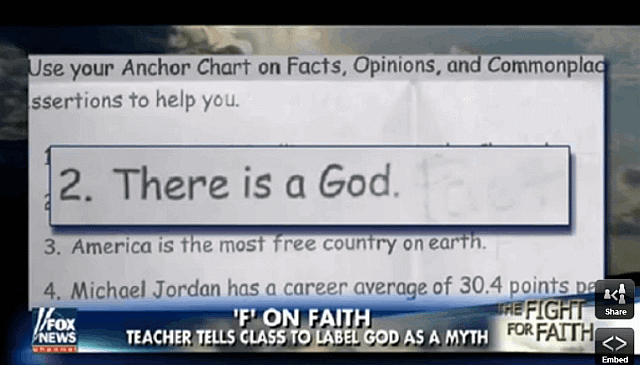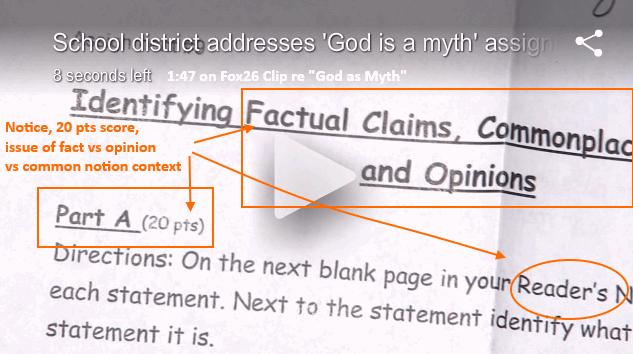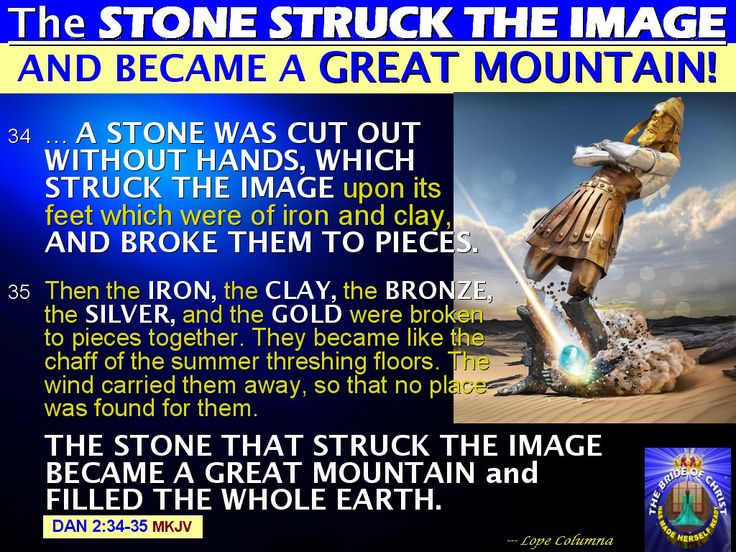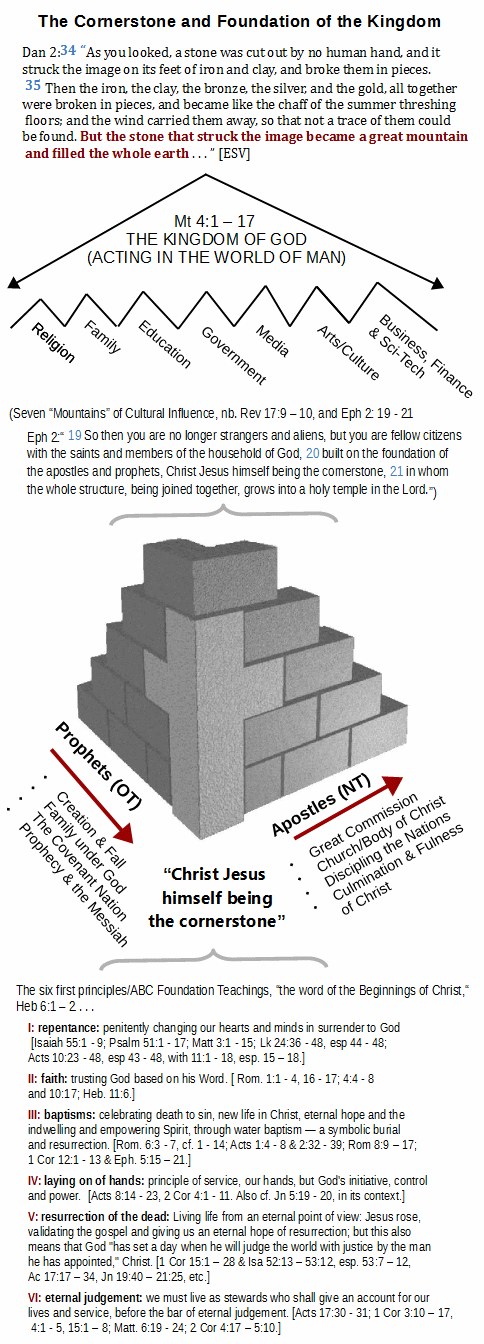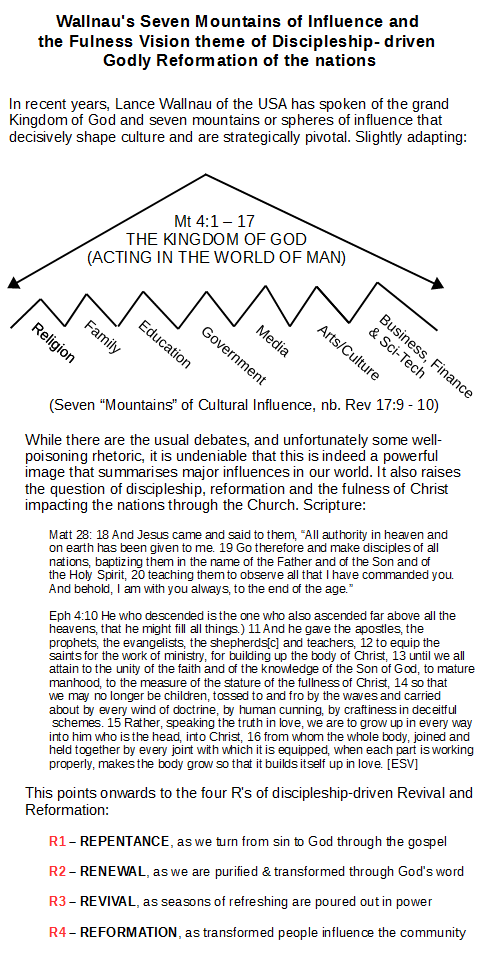The core challenge being addressed (as we respond to abuse of a critical thinking curriculum) is the notion that belief in the reality of God is a culturally induced, poorly grounded commonplace notion. An easily dismissed cultural myth or prejudice, in short.
Let us remind ourselves of the curriculum content used by teachers in a district in Texas until protest led to removal of the focal question:
Having:
- shown that such belief is deeply rooted in key, serious thought (also note vids 1: Kreeft, 2: Zacharias, 3: Craig, also 4: Stroebel on Jesus),
- (exposing the flying spaghetti monster parody as strawman fallacy)
- and noting (cf here in op and here as a comment) how it underpins the moral fabric of governance for modern liberty and democracy by way of reference to the US DoI 1776 in context
- and having reminded one and all that lab coat clad evolutionary materialist scientism is self-referentially incoherent and so self-falsifying [as in, the shoe is on the other foot],
. . . we should now turn to the responsible reasonableness of ethical theism.
No, we are not here claiming certain proof of the reality of God that once dismissed can lead to an assumed atheistical default. Instead, ethical theism starts as a responsible worldview with substantial evidence and reasoning so that proper education will respect it as a serious option and will address the comparative difficulties challenge (cf. tip sheet) — factual adequacy, coherence (logical and dynamical) and explanatory adequacy — faced by all worldviews:

Just the opposite of the cynically dismissive one liner presented by the critical thinking curriculum, so called.
As a first point, we briefly reflect on modes of being and the significance of such for world-roots given functionally specific complex organisation, cosmological fine tuning and our patent staus as under moral governance as pointers.
First, an in-brief:
>>Our observed cosmos — the only actually, indisputably observed cosmos — is credibly contingent. That points beyond itself to adequate cause of a fine tuned cosmos set to a locally deeply isolated operating point for C-Chemistry, aqueous medium, cell based terrestrial planet life. Life which BTW is based on coded information . . . language! right from the origin of cell based life . . . used in exquisitely intricate cybernetic systems that run the smart gated, encapsulated metabolic automata with integral code using von Neumann kinematic self replicators we find in cells. That in the end through even multiverse speculations, points to necessary, intelligent, awesomely powerful being as source. Design by a creator beyond the cosmos. One intent on life like ours. Mix in moral government and we are at the inherent reasonableness of a creator capable of grounding ought. Just one serious candidate, the inherently good Creator God, a necessary and maximally great being, worthy of our loyalty and the reasonable service of doing the good in accord with our evident nature. No, we are not talking about poorly supported popular notions here, but of course, when the evolutionary materialist lab coat clad magisterium controls and censors what gets into the curricula they can make it seem that way.>>
Now, we can think of possible vs impossible beings (you, me, a unicorn vs a square circle). The latter cannot be in any possible world as the cluster of core requirements (a) squarishness and (b) circularity stand in mutual contradiction and cannot all be actualised in one and the same thing at once under the same circumstances.
The former, can exist in at least one possible world, whether or not they are actual in this world (the only generally observed actualised world).
Also, try to imagine a world in which the truth asserted in: 2 + 3 = 5 is false or was not so then came into being at some point or can cease to be so. No such world is possible, this proposition is a necessary though abstract being. That is, it is so anchored to the roots and framework for a world to be actualised that it will be so in any possible world:
|| + ||| –> |||||
(Where we can start with the set that collects nothing and compose the natural numbers etc, {} –>0, {0}–> 1, {0, 1} –> 2, etc.)
This allows us to understand that of possible beings some are contingent, some are necessary. Contingent beings will exist in some actualisable worlds but not in all such possible worlds. Necessary beings, by contrast are foundational to any actualisable world existing.
Contingent beings, then, depend on what I have termed external, on/off enabling causal factors (strictly, dynamically necessary causal factors), much like a fire depends for its beginning and sustained existence on heat, fuel, oxidiser and an un-interfered- with combustion chain reaction:
 Public domainBy contrast, necessary beings do not have that sort of dynamical, causal dependence.
Public domainBy contrast, necessary beings do not have that sort of dynamical, causal dependence.
This has a major consequence, especially when we see that we live in a world that per the big bang and fine tuning considerations, is credibly contingent and in fact credibly finitely old, typically 13.7 or 13.8 BY being a conventional estimate:
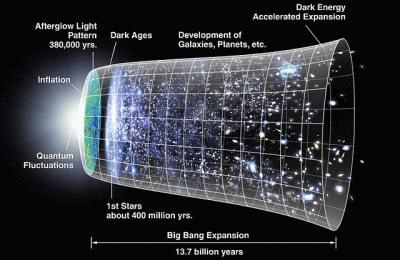
Typically the talk is of a singularity and perhaps a fluctuation. But the point is, finitely remote, changeable, composite, contingent. Caused, requiring a sufficient cluster of underlying dynamical antecedents/ factors that include at minimum all necessary factors.
But there is more.
For by contrast with being we can have non-being, a genuine nothing (and no a suggested quantum foam with fluctuations, etc, is not a genuine nothing, regardless of clever talking points).

Non-being can have no causal capabilities, and so if there ever were a genuine nothing, such would forever obtain. That is, if a world now is (and a credibly contingent one) it points to something that always was, a necessary, independent, world-root being dynamically sufficient to account for the world that now is. A world with evident beginning at a finitely remote point, with evident fine tuning that sets its physics to a locally deeply isolated operating point that sets it up for C-chemistry, aqueous medium terrestrial planet, cell based life. Life, that is based on smart gated, encapsulated metabolic automata that enfold an integral code using — language! communication and control systems! — von Neumann kinematic self replication facility. A class of machines we know how to conceptualise and initially analyse, but not at all how to design and implement. Worse, where we are conscious, intelligent, morally governed life forms in this cosmos that require a bridge between IS and OUGHT.
Already, we see that a very reasonable worldview stance would be that the cosmos comes from a necessary, highly intelligent, designing world root being who is a necessary being, and thus would be immaterial and intelligent, so minded. Even, through a multiverse speculation (which is spectacularly in violation of requisites of empirical substantiation and the multiplication of entities without clear necessity).
Moreover, as one scans the debates on worldviews foundations across the centuries, it is clear that there is just one credible place for there to be an IS that also grounds OUGHT in a reasonable way: the roots of reality.
There is just one serious candidate to be such a necessary being — flying spaghetti monsters et al (as we already saw) need not apply, they are patently contingent and are material — namely,
THE GOD OF ETHICAL THEISM: the inherently good and wise Creator God, a necessary and maximally great being; one worthy of our loyalty and of the reasonable and responsible service of doing the good in accordance with our evident nature and circumstances.
That is, ethical theism is a reasonable, and intellectually viable worldview stance. It is also a descriptive term for the underlying worldview of the Judaeo-Christian Faith and theological tradition that is core to our civilisation and the foundation of that tradition, God. Where the God of Scripture says of himself c 1460 BC, I AM THAT I AM, i.e. necessary, eternal being, something not understood as to significance until many centuries later.
And in that context, it is the Christian tradition that this same God has come among us, as Jesus of Nazareth, the Christ who fulfills the prophecies in that scriptural tradition and now sends forth his apostles and disciples into the world who are to be as wise as serpents but harmless as doves:
So, let us ponder Stroebel on Jesus:
[vimeo 17960119]
And, let us ponder Peter as he faced death by sentence of Kangaroo Court on a false accusation of treasonous arson against Rome, c 65 AD:
2 Peter 1:13 I think it right, as long as I am in this body,[h] to stir you up by way of reminder, 14 since I know that the putting off of my body will be soon, as our Lord Jesus Christ made clear to me. 15 And I will make every effort so that after my departure you may be able at any time to recall these things.
16 For we did not follow cleverly devised myths when we made known to you the power and coming of our Lord Jesus Christ, but we were eyewitnesses of his majesty . . . .
19 And we have the prophetic word more fully confirmed, to which you will do well to pay attention as to a lamp shining in a dark place, until the day dawns and the morning star rises in your hearts, 20 knowing this first of all, that no prophecy of Scripture comes from someone’s own interpretation. 21 For no prophecy was ever produced by the will of man, but men spoke from God as they were carried along by the Holy Spirit.
In short, contrary to the false impression created by the authors of the curriculum in Texas, ethical theism in the Judaeo-Christian tradition is a reasonable faith and worldview stance, one to be treated with respect rather than their patent disdain.
And, of course, this post is open for responsible discussion. END
